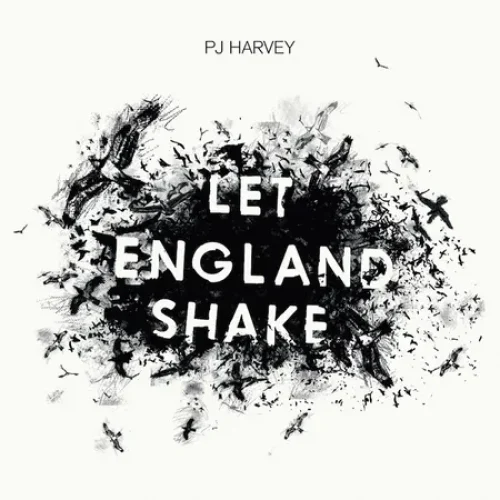Released in 2011, PJ Harvey’s Let England Shake marks a pivotal moment in her illustrious discography, reflecting both a departure from and an evolution of her previous work. Known for her chameleonic ability to reinvent her sound with each album, Harvey delves into the realms of political commentary and historical reflection with Let England Shake. This album diverges significantly from the raw, emotional intensity of her early work and the introspective minimalism of her mid-career albums such as White Chalk.
Let England Shake arrives in a broader musical landscape where the lines between genres blur, and artists increasingly use their platforms to comment on societal issues. In this context, Harvey’s album stands out as a profound exploration of war, nationalism, and the human condition, drawing upon historical events and contemporary reflections. The album’s soundscape combines folk, rock, and avant-garde elements, creating an atmosphere that is both haunting and compelling.
Artistic Intentions
Harvey’s artistic intentions with Let England Shake are clear: she sought to craft an album that not only captures the essence of England’s past and present but also provokes thought and dialogue about its future. Through interviews and album notes, Harvey has articulated her desire to address the complexities of national identity and the impact of conflict, drawing listeners into a narrative that is as much about personal introspection as it is about collective memory. This album, therefore, is not just a collection of songs but a cohesive artistic statement that challenges and enriches the listener’s understanding of England’s place in the world.
Sonic Exploration

Production Quality
The production quality of Let England Shake is meticulously crafted, achieving a balance between clarity and an evocative, almost ethereal atmosphere. Co-produced by Harvey, Flood, and John Parish, the album features a production style that is both polished and textured, allowing each element to shine while maintaining a cohesive sonic identity. The production is neither overly polished nor deliberately lo-fi, but instead strikes a middle ground that serves the album’s thematic weight. This approach creates an immersive listening experience, drawing the audience into the depths of Harvey’s reflections on war and identity.
Musical Arrangements
The musical arrangements on Let England Shake are both innovative and hauntingly memorable. Harvey employs a diverse array of instruments, including autoharps, trombones, and saxophones, alongside traditional rock instrumentation. These choices contribute to a sound that is rich and layered, yet never overwhelming. Her vocal delivery is often stark and resonant, sometimes multi-tracked to create a chorus-like effect that amplifies the album’s themes of collective memory and national history.
One standout example is the title track, where Harvey’s autoharp provides a shimmering foundation, over which her vocals float with a haunting, almost detached quality. In “The Words That Maketh Murder,” the interplay between the trombone and the guitar creates a dissonant yet compelling soundscape, mirroring the song’s grim subject matter. Throughout the album, these intricate arrangements enhance the narrative, making the music itself a vital component of the storytelling.
Genre Elements
Let England Shake touches upon a variety of musical genres, skillfully blending elements of folk, rock, and avant-garde to create a sound that is distinctly its own. While the album has roots in the folk tradition, with its storytelling and acoustic instrumentation, it also incorporates the raw energy and intensity of rock. The avant-garde influences are evident in the unconventional song structures and experimental sounds that pervade the album.
Harvey does not confine herself to a single genre but rather uses each as a tool to convey different aspects of her thematic concerns. For instance, the folk influences ground the album in a sense of history and tradition, while the rock elements inject a sense of urgency and immediacy. This genre-blending is done not for the sake of novelty but to serve the album’s overarching narrative, making Let England Shake a compelling and multifaceted work that defies easy categorization.
Lyrical Analysis

Themes and Messages
The central themes of Let England Shake revolve around war, national identity, and the profound effects of historical events on the present. PJ Harvey delves into England’s past, using vivid imagery and poignant narratives to explore the country’s complex legacy. The album frequently references specific wars, such as World War I and the conflicts in Iraq and Afghanistan, to highlight the cyclical nature of violence and its enduring impact on society.
Recurring motifs throughout the album include bloodshed, displacement, and loss. In “The Words That Maketh Murder,” Harvey paints a grim picture of war’s brutality with lines like “I’ve seen soldiers fall like lumps of meat.” Similarly, “On Battleship Hill” juxtaposes the natural beauty of the landscape with the horrors of battle, creating a stark contrast that underscores the tragic waste of human life. The album’s title track, “Let England Shake,” serves as a thesis statement of sorts, encapsulating the overarching theme of a nation grappling with its identity amidst the echoes of its tumultuous history.
Lyrical Depth
Harvey’s lyrics on Let England Shake are both complex and poetic, blending straightforward narrative with abstract, evocative imagery. Her storytelling is rich with historical references and allusions, inviting listeners to delve deeper into the meanings behind her words. The lyrics are meticulously crafted, offering layers of interpretation that reveal themselves over multiple listens.
For example, in “The Glorious Land,” Harvey asks, “What is the glorious fruit of our land? Its fruit is deformed children.” This stark, direct question is laden with meaning, pointing to the devastating consequences of war on future generations. The poetic nature of her lyrics allows for a wide range of emotional responses, from horror and sorrow to contemplation and reflection. Harvey’s ability to weave historical detail with personal sentiment makes the album’s lyrical content profoundly affecting and thought-provoking.
Emotional Impact
The lyrics of Let England Shake contribute significantly to the album’s emotional resonance, evoking a deep sense of empathy, sadness, and contemplation. Harvey’s vivid descriptions and poignant storytelling compel listeners to confront the harsh realities of war and its aftermath. Tracks like “In the Dark Places” and “All and Everyone” elicit a sense of mourning and loss, their somber tone reflecting the collective grief of communities affected by conflict.
Conversely, songs like “Written on the Forehead,” with its chorus of “Let it burn,” convey a sense of urgency and a call to reckon with the present in light of the past. The emotional impact of Harvey’s lyrics is further amplified by her vocal delivery, which ranges from plaintive and haunting to fierce and impassioned. This dynamic performance ensures that the listener not only understands the weight of the album’s themes but feels them deeply, making Let England Shake an emotionally powerful and intellectually stimulating experience.
Cohesion and Flow

Track Progression
Let England Shake excels in its seamless track progression, each song flowing naturally into the next, creating a cohesive narrative journey. The album opens with the title track, “Let England Shake,” immediately setting the tone with its contemplative lyrics and haunting melody. This track serves as an introduction to the album’s central themes of war, nationalism, and historical reflection.
As the album progresses, it takes the listener through a series of vivid and often unsettling vignettes. For instance, “The Words That Maketh Murder” transitions into “All and Everyone,” deepening the exploration of war’s brutal consequences. The transition between these tracks feels organic, aided by the consistent thematic focus and the use of recurring musical motifs. Harvey’s adept sequencing ensures that the emotional intensity of the album builds and recedes at just the right moments, maintaining the listener’s engagement throughout.
The penultimate track, “Hanging in the Wire,” serves as a poignant moment of reflection before the closing track, “The Colour of the Earth.” This final song provides a sense of resolution, tying together the album’s themes with a chorus that echoes the collective voices of those affected by war. The careful structuring of the album ensures a satisfying narrative arc, leaving the listener with much to ponder.
Thematic Consistency
Let England Shake maintains a remarkable consistency in themes, styles, and emotions, making it a cohesive and unified work. From start to finish, the album is firmly anchored in its exploration of England’s historical and contemporary identity, particularly through the lens of conflict. The thematic focus on war and its repercussions is consistently reinforced by Harvey’s evocative lyrics and the album’s somber, reflective tone.
Musically, the album also exhibits stylistic consistency. Harvey’s use of folk and rock elements, combined with avant-garde influences, creates a distinctive sound palette that persists throughout the album. This blend of genres is not only innovative but also serves to underscore the album’s themes, ensuring that the listener is continually immersed in the world Harvey has crafted.
Despite the heavy subject matter, Harvey manages to avoid monotony through varied musical arrangements and dynamic shifts in mood. Tracks like “The Glorious Land” and “Written on the Forehead” introduce different tempos and instrumental textures, providing variety while still adhering to the album’s overarching narrative. There are no jarring shifts in style or tone; instead, each song contributes to the album’s central themes, enriching the listener’s experience and reinforcing the sense of a cohesive, intentional work.
Standout Tracks and Moments

Highlight Key Tracks
Several tracks on Let England Shake stand out for their artistic merit, innovation, and emotional impact, each contributing uniquely to the album’s narrative.
“Let England Shake”: The title track sets the tone for the entire album with its hypnotic autoharp and Harvey’s ethereal vocals. The song’s poetic lyrics—”The West’s asleep. Let England shake, weighted down with silent dead”—immediately draw the listener into a contemplation of England’s historical burden. The fusion of folk melodies with a modern rock sensibility creates an arresting opening statement.
“The Words That Maketh Murder”: This track is particularly notable for its biting commentary on the horrors of war. The juxtaposition of upbeat, almost jaunty instrumentation with grim lyrics like “I’ve seen and done things I want to forget” creates a powerful contrast. The memorable refrain, “What if I take my problem to the United Nations?”, adds a layer of political critique that resonates deeply.
“The Glorious Land”: Featuring a sample of a military bugle call, this track blends folk-rock with an anti-war message. The lyrics question the glorification of war, and the stark imagery of “deformed children” starkly conveys the brutal aftermath of conflict. The use of dissonant guitar riffs and brass instruments enhances the song’s haunting quality.
“Written on the Forehead”: This track stands out for its innovative use of a reggae sample from Niney’s “Blood and Fire,” which Harvey seamlessly integrates into her own composition. The refrain “Let it burn” coupled with the apocalyptic imagery of the lyrics creates an intense, urgent atmosphere, making it one of the album’s most compelling songs.
Memorable Moments
Autoharp in “Let England Shake”: The shimmering autoharp in the opening track not only sets a unique tonal foundation but also introduces an instrument not typically associated with rock, showcasing Harvey’s willingness to experiment and innovate.
Refrain in “The Words That Maketh Murder”: The shift from Harvey’s stark verses to the ironic, almost playful refrain highlights her skill in creating contrasts that emphasize her themes. The line “What if I take my problem to the United Nations?” serves as a biting critique of bureaucratic responses to war, encapsulating the album’s critical edge.
Bugle Call in “The Glorious Land”: The inclusion of a bugle call serves as a recurring motif throughout the track, symbolizing military presence and its intrusive nature in the pastoral imagery of England. This clever use of sampling reinforces the album’s central theme of conflict and its pervasive impact.
Vocal Delivery in “On Battleship Hill”: Harvey’s vocal performance on this track is particularly striking, with her voice soaring over a melancholic arrangement of guitars and percussion. The line “Cruel nature has won again” is delivered with such emotional weight that it captures the essence of the album’s contemplation on the inevitability and tragedy of war.
Reggae Sample in “Written on the Forehead”: The seamless incorporation of the reggae sample creates a layered texture that adds depth to the song. The juxtaposition of Harvey’s vocals with the reggae chorus not only enhances the track’s sonic richness but also underscores the global reach of the album’s themes.
Artistic Contribution and Innovation

Place in Genre/Industry
Let England Shake occupies a unique and significant place within both the rock and folk genres, and more broadly, within the music industry at large. Released in an era marked by a resurgence of politically charged music, PJ Harvey’s album stands out for its historical depth and lyrical sophistication. While many artists at the time were commenting on contemporary issues, Harvey chose to delve into the past, drawing parallels between historical conflicts and modern-day strife. This historical perspective not only distinguishes the album but also provides a timeless quality that sets it apart from more transient, topical works.
In the broader context of her discography, Let England Shake represents a bold artistic evolution. While Harvey had previously explored themes of personal and emotional turmoil, this album marks a deliberate shift towards broader, socio-political commentary. This thematic expansion allows Harvey to engage with a wider audience, connecting personal narratives with collective historical experiences. The album’s critical success, including winning the prestigious Mercury Prize, underscores its impact and solidifies its place as a landmark work in Harvey’s career and in the early 21st-century music landscape.
Innovation
Let England Shake is innovative in several key aspects, notably in its production, genre-blending, and thematic exploration.
Production: The album’s production, overseen by Harvey, Flood, and John Parish, is both meticulous and adventurous. The decision to use a variety of unconventional instruments, such as the autoharp and saxophone, alongside traditional rock instrumentation, creates a rich and textured soundscape. This blend of instruments contributes to a distinctive sonic identity that enhances the album’s thematic concerns. The use of samples, like the military bugle call in “The Glorious Land” and the reggae snippet in “Written on the Forehead,” adds further depth and complexity, integrating diverse musical elements in a seamless and impactful manner.
Genre Approach: Harvey’s approach to genre is particularly innovative. By fusing elements of folk, rock, and avant-garde music, she creates a sound that defies easy categorization. This genre-blending not only showcases her versatility as an artist but also serves to reinforce the album’s themes. The folk influences ground the album in a sense of historical tradition, while the rock elements inject energy and immediacy, and the avant-garde aspects lend an air of unpredictability and innovation. This eclectic mix is not merely for show; it is a deliberate artistic choice that enhances the narrative and emotional resonance of the album.
Thematic Exploration: The thematic scope of Let England Shake is another area where Harvey breaks new ground. The album’s focus on war, national identity, and the human cost of conflict is explored with a depth and nuance that is rare in contemporary music. Harvey’s ability to weave historical detail with personal reflection results in a work that is both intellectually engaging and emotionally powerful. Her lyrics are poetic yet direct, capturing the brutality of war and the fragility of human life in a manner that is both haunting and thought-provoking.
Closing Thoughts

Let England Shake stands as a powerful testament to PJ Harvey’s artistic prowess and her willingness to explore new thematic and musical territories. The album’s strengths are manifold, starting with its profound lyrical content that delves deep into the themes of war, national identity, and the human condition. Harvey’s ability to blend historical reflection with contemporary relevance creates a timeless quality that resonates deeply with listeners.
Musically, the album is a triumph of innovation and cohesion. The meticulous production, the integration of unconventional instruments, and the seamless blending of folk, rock, and avant-garde elements result in a rich, textured soundscape that enhances the thematic content. Standout tracks like “Let England Shake,” “The Words That Maketh Murder,” and “Written on the Forehead” not only showcase Harvey’s talent for storytelling but also highlight her skill in crafting memorable and impactful music.
However, the album is not without its minor weaknesses. Some listeners might find the heavy thematic focus and somber tone challenging, as the album demands a deep engagement with its content. Additionally, the innovative use of samples and unconventional instruments, while largely successful, might not appeal to those who prefer more traditional rock or folk sounds.
Despite these minor points, Let England Shake is a landmark album in PJ Harvey’s career and a significant contribution to contemporary music. Its critical acclaim and the prestigious awards it has garnered underscore its impact and importance. Harvey’s exploration of England’s past and present through the lens of war and identity offers listeners a thought-provoking and emotionally resonant experience.
Official Rating
In conclusion, Let England Shake is an album that challenges, engages, and ultimately rewards its listeners. It showcases PJ Harvey at her creative peak, pushing boundaries and expanding the scope of her artistry. Given its profound lyrical content, innovative musical arrangements, and thematic depth, I would rate this album a 9 out of 10. This rating reflects its excellence and the lasting impact it is likely to have on listeners and within the broader music landscape. Let England Shake is not just an album; it is a profound artistic statement that solidifies PJ Harvey’s position as one of the most compelling and innovative artists of our time.
